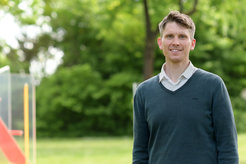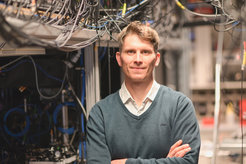Johannes Zeiher appointed professor at Ludwig Maximilian University
Quantum physicist and planqc co-founder Johannes Zeiher has been appointed as a W2 professor at LMU Munich.
Johannes Zeiher has accepted a tenure-track W2 professorship at Ludwig Maximilian University of Munich. His chair in Artificial Quantum Matter is part of the Faculty of Physics’ Quantum Optics group. At LMU, Zeiher will expand the work of his independent research group, originally established at the Max Planck Institute of Quantum Optics (MPQ), while continuing to collaborate closely with the institute.

Zeiher’s research focuses on interfaces in complex quantum systems. Together with his team, he arranges, manipulates and controls individual neutral atoms using optical tweezers. In recent years, researchers have gained increasingly precise control over such systems – even enabling the creation of entangled atomic states. Neutral atoms are now seen as one of the most promising platforms for quantum simulation and computing.
A central theme of Zeiher’s work is the interface between atomic registers and individual light quanta. These couplings make it possible to implement measurement-based feedback control in quantum systems – a key requirement for quantum error correction in quantum computers. They also play a crucial role in quantum networks, where photons are used to entangle remote systems. His research lays important groundwork for future applications across various quantum technologies.

Zeiher will continue his close collaboration with MPQ and remain involved in several projects, including work on strontium Rydberg atoms, quantum gas microscopy and the Munich Quantum Valley (MQV). Technology transfer also remains a priority – for example, through the quantum computing start-up planqc, which he co-founded. “Compared to other countries, too few ideas from Europe’s excellent basic research make it into commercial technology,” he says. “I want to help realise more of that potential.”
Alongside his research, Zeiher is committed to training the next generation of quantum scientists. His new position at LMU will offer new opportunities to do so: “I’m excited to share my enthusiasm for quantum research in teaching and hope to inspire many students to join this exciting and fast-moving field,” he says.













